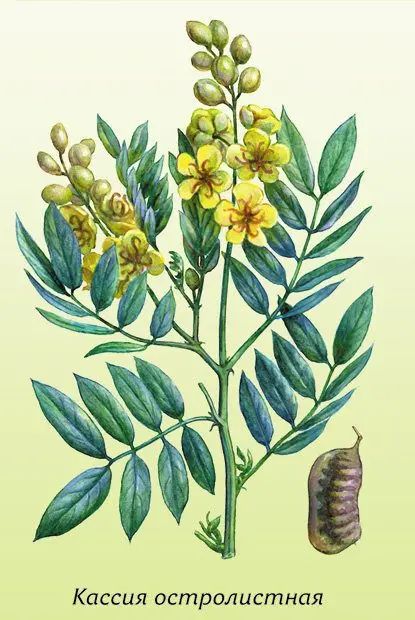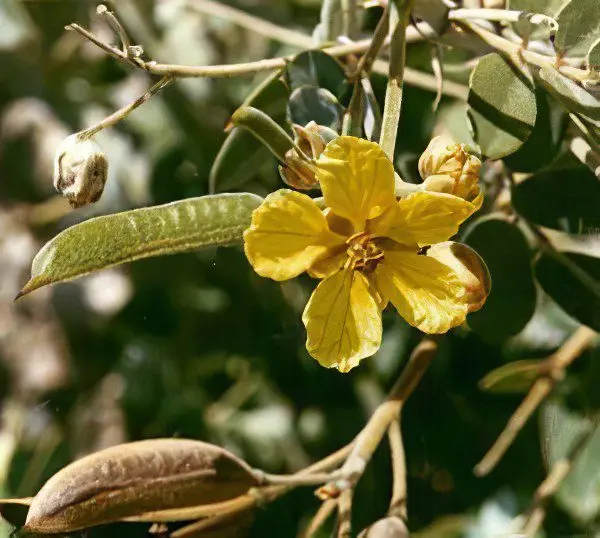Contents
Useful properties of essential oil and recipes for the use of cassia holly
Botanical characteristics of cassia holly

Cassia is a semi-shrub that is a perennial plant and related to legumes. It does not exceed 1 meter in height. The root of the plant is dark brown, weak, with a small number of branches. Leaves with thorns and stipules are located on branched and long stems. Cassia flowers are irregularly shaped, consisting of 5 petals and 10 stamens. The fruit of cassia is a bean, slightly curved, 6 cm long. On the outside of the bean, the outlines of the chambers with seeds are visible. Inside the bean are flat yellow seeds.
The flowering of the plant begins in June and lasts until autumn, and the fruit ripens in October.
Cassia is very common in the tropics of Africa, and in deserts and semi-deserts. The plant is cultivated in Egypt, India, Central Asia, Crimea and Pakistan.
Useful properties of cassia holly
Cassia contains organic acids, flavonoids, ash, macro- and microelements such as chromium, copper, zinc and others. Cassia leaves contain myricyl alcohol.
Cassia has laxative and diuretic properties. Preparations from this plant stimulate appetite. The main active ingredient of cassia are anthraglycosides, due to which the motor function of the large intestine improves. Cassia has a mild choleretic and antitoxic properties, so it is used by people with impaired functions of the gallbladder and liver. Cassia preparations are recommended for anal fissures, paraproctitis and hemorrhoids.
Due to its many beneficial properties, cassia is used for constipation, skin diseases, edema and glaucoma.
Essential oil of cassia holly
Cassia essential oil is obtained by hydrodistillation from the leaves, bark or branches of the plant. This oil has a bactericidal, astringent and expectorant effect. With the help of cassia oil, you can normalize digestion, eliminate spasms in the intestines. Cassia essential oil is taken as an anti-inflammatory, antispasmodic, carminative and antirheumatic agent.
The oil of this medicinal plant prevents the accumulation of extra pounds, and it also improves skin regeneration, makes it more elastic, nourishes skin cells and hair follicles.
Cassia essential oil is a powerful aphrodisiac.
Cassia oil is used for fevers, nausea, depression, stress, wasp and bee stings, nervous exhaustion and colds. In addition to these diseases, the oil of this plant helps with skin inflammation. Due to its strong bactericidal properties, cassia oil is added to the composition of mouth rinses.
Since the oil is toxic and can irritate mucous membranes and sensitive skin, it must be used with caution.
The use of cassia holly

For medicinal purposes, cassia leaves and its fruits are used (less often). Cassia leaves are one of the ingredients in an anti-hemorrhoid tea or laxative tea. Cassia is used as a narcotic and sleeping pill. This plant is used for carbon monoxide poisoning. Large doses of cassia help with schizophrenia. Cassia tincture kills tuberculosis bacillus and various viruses.
Cassia has one distinctive feature, which is as follows: from its use it improves the stool. It also normalizes the biliary function of the liver. Cassia is used by surgeons before surgery, or after surgery for atony of the large intestine.
Hemorrhoidal tea. To prepare it, you need to take cassia leaves, buckthorn bark, coriander fruits, yarrow grass and licorice root in equal amounts. Now one tablespoon of such a collection should be poured with a glass of boiling water and insisted for 20 minutes. After straining the finished tea, it is taken before going to bed, 100–200 ml each.
Laxative infusion of cassia. Take 1 tablespoon of cassia herb and pour 200 ml of boiling water over it. Leave to brew for 4 hours. Take the finished product after filtering. The infusion should be drunk at night in small sips.
Contraindications to the use of cassia holly
You can not use cassia preparations for a long time, as they can be addictive to the body. Pregnant and lactating mothers are strictly forbidden to take drugs from this plant. If a person has diarrhea, acute inflammation of the small or large intestine, then cassia preparations are also contraindicated for him. If there are signs of individual intolerance, cassia is not used.









